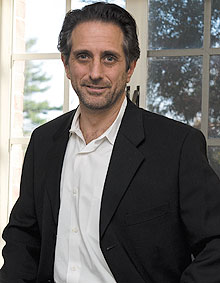  |
| HOME | THIS ISSUE | CALENDAR | GRANTS | BACK ISSUES | < BACK | NEXT > |
Philosopher links happiness and morality in upcoming book by Scott Brinckerhoff - February 4, 2008 | ||||
| One day recently, Paul Bloomfield wondered aloud whether Robinson Crusoe, fiction’s most famous castaway, might have to make moral decisions. For some philosophers, Bloomfield said, morality has only to do with relations among people, so they would argue that since Crusoe is alone, anything goes. But Bloomfield, an associate professor of philosophy, subscribes to a different school of thought: “I believe morality speaks to what sort of person you’re going to be, what sort of life you’re going to live. I think a Robinson Crusoe does have moral decisions to make – does he behave wisely, or recklessly and foolishly? Does he decide to commit suicide? Viewed from afar, would his actions seem cowardly or courageous?” This year, Bloomfield is a Fellow at the UConn Humanities Institute, writing a book, A Theory of the Good Life, in which he argues, “It’s good to be good and bad to be bad.” While this tenet might sound self-evident, everyday life teems with evidence that not everyone has gotten the message. Although Bloomfield has written extensively on morality and ethics, the new book will be his first aimed at a lay, rather than an academic, audience. “I don’t think a theory of morality and the good life should be so sophisticated, so technical, and so complicated that regular folks can’t understand it,” he says. “Moral issues touch all of us.” A Theory of the Good Life will take the position that happiness and the good life flow from living as morally as possible. Bloomfield adds, “The harm of being immoral is that it keeps one from seeing the value of human life, and if one is human, then one is kept from seeing the value of one’s own life.” The self-harm occurs, he says, whether or not one’s immorality is exposed to others. He also argues that virtue is a sign of maturity, while immoral behavior is most often the product of immaturity. For example, a spouse who betrays a mate shows that he or she doesn’t understand love, Bloomfield says. “From childhood, we learn lessons through rewards and punishments,” he says, “but as we mature, we learn other reasons for doing or not doing something, whether it’s tossing litter on the sidewalk, treating animals with kindness, or stealing money from a petty cash drawer. “I think a lot of the immoral behavior in the world happens because people think they can get away with it,” he adds. “I think that there is no getting away with it – you always damage your self-respect and integrity, and that’s often on top of the obvious harms done to other people.” Bloomfield’s central position is at variance with philosophers who maintain that self-interest, often in the form of material, sensual, or other gain, may trump virtue, especially when the “immoral” act arguably does not hurt anyone.
He summarizes those contrary views as, “Morality is for suckers.” In Moral Reality, his first book, Bloomfield posited that there are facts about morality, that morality isn’t based simply on shifting social mores. Looked at in the context of justice, his point is easy to understand: “If everybody decided that racism is socially acceptable, that wouldn’t make it morally acceptable. If everyone in the world can be wrong about a moral issue, then morality can’t be decided by consensus. “Moral decisions are the hardest we make, and arguably our most important decisions,” Bloomfield says. “Often, people’s values do not align in the same way and difficult decisions must be made between unsatisfying alternatives, often without anything close to full information.” In an extreme situation such as occurred in Sophie’s Choice, an individual may face what philosophers call a “tragic dilemma,” in which any decision is life-ruining. Bloomfield’s research into morality never drifts into religious waters, even though religion may well be a pillar supporting moral behavior for many people. “Nothing I say requires God or requires us to do without God,” he says. “It’s completely neutral with regard to religion. Living morally should appeal to atheists as well as theists. Maybe there is a heaven and maybe there isn’t. But the motivation to be good should not hang on an answer to this question. I think there are sufficient reasons to live morally right here on earth.” Moral living at its best is apt to include devotion beyond oneself, Bloomfield suggests. “By being devoted to anything worthy, such as family, science, or music, one learns to be better at loving what is good, while also becoming more worthy of love from those who are good. Ultimately, however, the people who live well, live morally, will live as good a life as is possible for them.” Bloomfield, who arrived at UConn in 2000 after teaching at McGill University and the University of Arizona, earned his undergraduate degree at Tufts and his Ph.D. at Syracuse University. His areas of specialization are metaphysics and moral philosophy, and in particular, the intersection of these, a field called metaethics. |
| ADVANCE HOME UCONN HOME |

